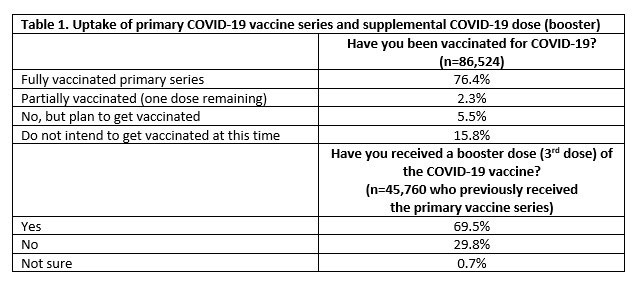Session Information
Date: Saturday, November 12, 2022
Title: Health Services Research Poster I: Lupus, RA, Spondyloarthritis and More
Session Type: Poster Session A
Session Time: 1:00PM-3:00PM
Background/Purpose: Sub-optimal COVID-19 vaccine uptake by patients with autoimmune conditions is an area of concern to many rheumatologists and other providers. It is important to understand which patients are receiving vaccines and the reasons why some are not. We surveyed a large convenience sample of patients in a network of rheumatology practices to ascertain vaccine use and hesitancy.
Methods: A tablet-based, electronic survey tool was used in a network of 101 rheumatology providers with over 250,000 patients. Providers in the network employ a tablet in their office as part of routine care to collect patient survey and outcome data directly from patients on their arrival for appointments. Patients were given this tablet with surveys that included a short series of COVID-19 vaccine-related questions between September 2021 and June 2022. Patients were asked about their COVID-19 vaccine status for both primary vaccine series and vaccine booster, to provide a time estimate on when they planned to start or complete their vaccination series, and reasons that they might not receive their COVID-19 vaccine or booster. We provide a descriptive analysis of vaccine receipt and reasons for hesitancy in this group.
Results: A total of 86,540 patients provided an answer to questions about their vaccination status (Table 1). Of those, 76% reported they had been fully vaccinated with the primary series (i.e., received the first 2 COVID-19 shots or the one-dose Johnson & Johnson vaccine). Another 2% reported that they were partially vaccinated (i.e., still had one shot remaining in their primary series) and an additional 6% said they had not received their first vaccine shot yet, but planned to. The remaining 16% replied that they did not intend to get a COVID-19 vaccination at this time. Over 50% of those who were fully vaccinated had received the Pfizer vaccine, followed closely by Moderna at 41% and 6% received the one-dose Johnson & Johnson vaccine. A total of 45,760 fully-vaccinated patients were asked if they had received a supplemental COVID-19 vaccine dose (booster) and 70% replied that they had received the booster. When asked about concerns with the COVID-19 vaccine and reasons they might not get a COVID-19 booster (Table 2), most patients cited concerns about vaccine safety (34%) or side effects (25%) with the primary series. While concerns about safety (21%) and side effects (15%) were also cited as reasons for hesitancy in receiving the booster, the biggest reason cited was that they had not been told by their doctor to get an additional dose (33%).
Conclusion: In a network of rheumatology practices, more than 75% reported being fully vaccinated with a primary vaccine series and 70% reported also having a supplemental COVID-19 dose (booster). Concerns about effectiveness and safety were cited as primary barriers to receiving the COVID-19 vaccine and reasons to not get the booster, while recommendation from the physician was also a big factor with the booster. Despite its wide availability and need for the COVID-19 vaccine in these patients, hesitancy about the vaccine remains a persistent concern.
To cite this abstract in AMA style:
Mudano A, Xie F, Stewart P, Jackson L, Danila M, Gavigan K, Nowell W, Venkatachalam S, Curtis J. COVID-19 Vaccine Uptake and Reasons for Hesitancy in a Large Rheumatology Practice Network [abstract]. Arthritis Rheumatol. 2022; 74 (suppl 9). https://acrabstracts.org/abstract/covid-19-vaccine-uptake-and-reasons-for-hesitancy-in-a-large-rheumatology-practice-network/. Accessed .« Back to ACR Convergence 2022
ACR Meeting Abstracts - https://acrabstracts.org/abstract/covid-19-vaccine-uptake-and-reasons-for-hesitancy-in-a-large-rheumatology-practice-network/


